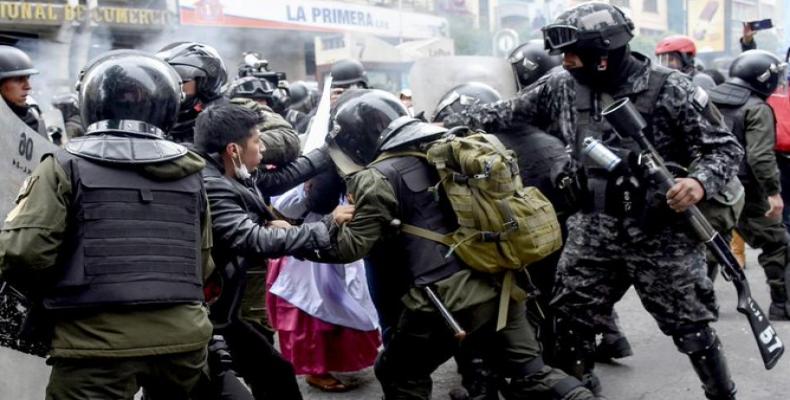La Paz, December 12 (RHC)-- The Inter-American Commission on Human Rights (IACHR) has called for an international investigation into human rights abuses in Bolivia following the disputed October presidential election that sparked weeks of violence.
Evo Morales resigned as president on November 10th amid pressure after an audit by the Organization of American States (OAS), which found widespread electoral irregularities. Morales maintains he was a victim of a coup. Weeks of unrest followed Morales's resignation, with security forces and protesters clashing in several cities as blockades went up that cut off major supplies of food and fuel.
In its preliminary report, published on Tuesday, the IACHR said it had found "strong indications of human rights violations, with profound repercussions for the life of Bolivian society." Bolivia's interim government, led by Jeanine Anez, disputed the report. "The Ministry of the Presidency considers that this is an unfair report that has not evaluated everything that happened during the events in November," Eddy Luis Franco, deputy minister for coordination with social movements, was quoted by state news agency ABI as saying on Wednesday.
At least 36 people have been killed in post-election violence, according to the report. On November 15, nine people were killed in the town of Sacaba after police and military attempted to stop a group of pro-Morales coca growers and farmers from marching to the city of Cochabamba. Four days later, nine others were killed in the El Alto neighbourhood of Senkata, just outside the capital city of La Paz, during a police and military operation to clear a blockade of a fuel plant. Both events can be categorised as massacres, the report said. Several people were also killed in Pedregal, to the south of La Paz.
The report recognized that a range of social groups took part in the post-election protests and violent acts were carried out by people of diverse political affiliations, but stated that the violations of human rights were carried out by state agents during the repression of protests.
In Sacaba and Senkata, security forces denied they had shot at protesters and said the protesters had been shooting among themselves. However, witnesses in both locations told IACHR they were unarmed and security forces fired on them. Several people in Senkata were killed simply passing by, the commission found.
Yosimar Choque Flores was walking through Senkata to the bank the day of the killings. Two blocks from the gas plant, he found people who were injured and stopped to help. He was shot in the arm as he tended to a woman who had passed out from the tear gas. "Left, right, all over the place, [the soldiers] were shooting," he told Al Jazeera.
The IACHR received several reports of corpses being removed by state agents. Several people reported seeing the bodies of a woman and a girl around the age of 12. According to the ombudsman's official list, all of those killed were men. Many survivors and witnesses believe the true death count is far higher than the nine reported, the commission found.
Of the hundreds of people detained during the violence, most are in preventive detention, according to Bolivia's general prosecutor. The IACHR's technical team found that the register of who has been detained is incomplete. The report quotes a report by the ombudsman stating that during cell visits, they found 18 people who had been injured, two of them seriously. They had not received medical attention.
Several people were also killed during clashes between opposing groups of protesters. One man had been tied up and died of strangulation and another was beaten to death by a group, the report said. Overall, at least 800 people were injured and that number is expected to rise.
The report also expressed concern about the political persecution of public functionaries who were working for Morales's government. The Association of Mayors of Bolivia reported that at least 65 local authorities had resigned as a result of pressure and intimidation. Ex-ministers said their addresses, phone numbers, and other personal details were being circulated on social media, and in some cases, this led to their houses being ransacked or burned.
About 50 journalists from 20 national and international media were attacked during the protests. Assaults came from both sides and, in some cases, security forces.
The report concludes with a series of recommendations for the Bolivian government, including guaranteeing the rights to protest and freedom of expression, comprehensive reparations for the victims' families, and bringing perpetrators to justice.
Bolivia's Congress approved last month a bill that annuls the result of October's election and calls for new elections to be held without Morales. The elections are expected sometime next year.


